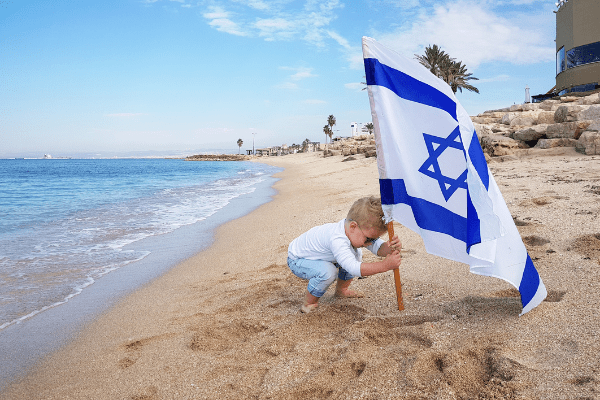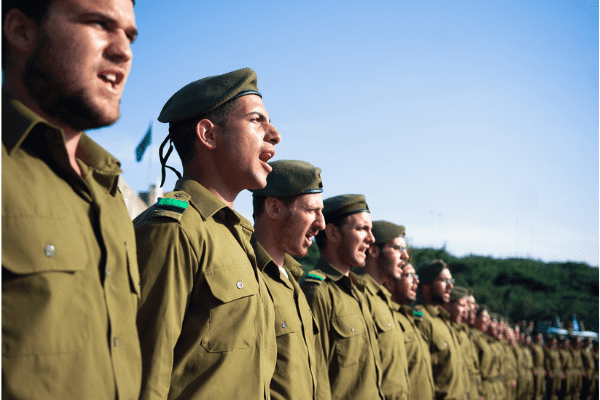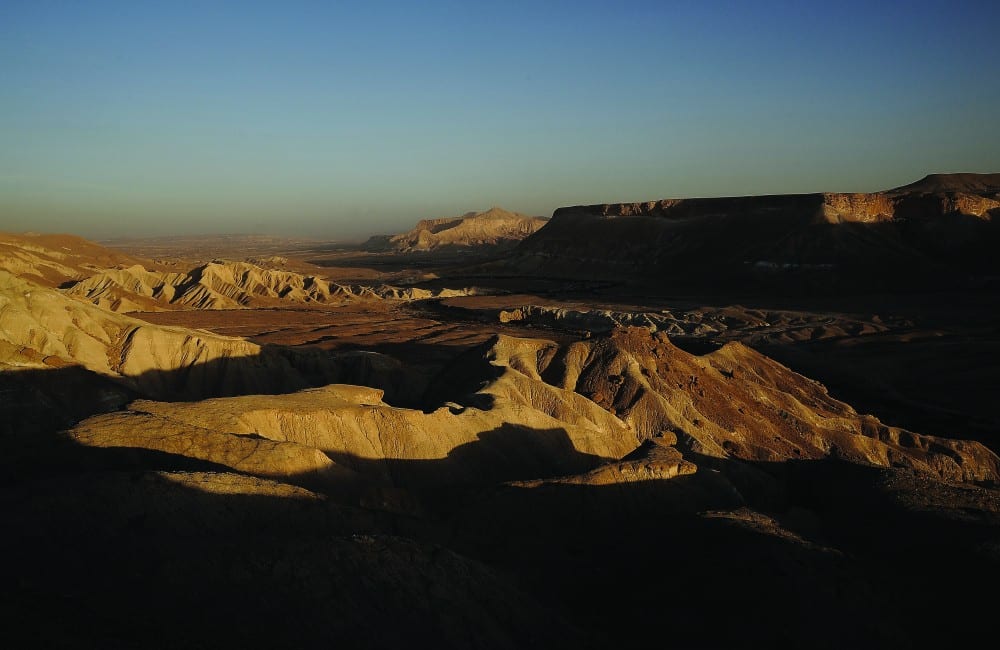
TORAH
NEVI'IM
KETUVIM
Chapter 1
Translation and Transliteration of
Listen to this chapter in Hebrew:
- Commentary
- Buy E-book
- Buy the Israel Bible
1On the first day of the second month, in the second year following the exodus from the land of Egypt, Hashem spoke to Moshe in the wilderness of Sinai, in the Tent of Meeting, saying:
vai-da-BAYR a-do-NAI el mo-SHEH b'-mid-BAR see-NAI b'-O-hel mo-AYD b'-e-KHAD la-KHO-desh ha-shay-NEE ba-sha-NAH ha-shay-NEET l'-tzay-TAM may-E-retz mitz-RA-yim lay-MOR
אוַיְדַבֵּר יְהֹוָה אֶל־מֹשֶׁה בְּמִדְבַּר סִינַי בְּאֹהֶל מוֹעֵד בְּאֶחָד לַחֹדֶשׁ הַשֵּׁנִי בַּשָּׁנָה הַשֵּׁנִית לְצֵאתָם מֵאֶרֶץ מִצְרַיִם לֵאמֹר׃
![]() 1:1 In the wilderness of Sinai, in the Tent of Meeting
1:1 In the wilderness of Sinai, in the Tent of Meeting
After a stay of almost a year in the Sinai Desert where the people received the Torah, constructed the Mishkan and studied some of their new laws, Sefer Bamidbar opens with the preparations to leave the desert and head to the Promised Land. The Ramban explains that their entry into Eretz Yisrael with the Torah in hand was the ultimate goal of the exodus from Egypt. The Mishkan, where Hashem reveals Himself on a daily basis, will allow the people to carry the experience of revelation at Mount Sinai with them on their journey, and He will ultimately find His permanent resting place on earth in the Beit Hamikdash in Yerushalayim. In this way, God remains permanently in their midst.
2Take a census of the whole Israelite community by the clans of its ancestral houses, listing the names, every male, head by head.
s'-U et ROSH kol a-DAT b'-nay yis-ra-AYL l'-mish-p'-kho-TAM l'-VAYT a-vo-TAM b'-mis-PAR shay-MOT kol za-KHAR l'-gul-g'-lo-TAM
בשְׂאוּ אֶת־רֹאשׁ כָּל־עֲדַת בְּנֵי־יִשְׂרָאֵל לְמִשְׁפְּחֹתָם לְבֵית אֲבֹתָם בְּמִסְפַּר שֵׁמוֹת כָּל־זָכָר לְגֻלְגְּלֹתָם׃
![]() 1:2 Take a census of the whole Israelite community
1:2 Take a census of the whole Israelite community
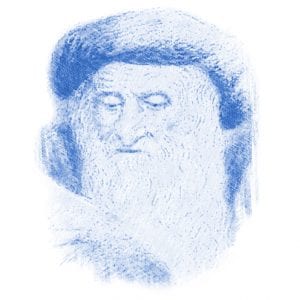
Rashi (1040-1105)
The foremost commandment given by Hashem to Moshe and Aharon in preparation for travel to the Land of Israel is to count the people. This is one of several censuses described in the Bible, and the first of two in Sefer Bamidbar. In fact, the English name of this book, Bamidbar, derives from these two countings. Since the Israelites are heading toward the Promised Land to conquer and settle it, the census serves to inform the leadership of how many soldiers they have available for their army and among how many people the land would then need to be divided. Rashi, however, gives another reason for the count. He explains that Hashem counts His people repeatedly, simply because they are precious to Him. Just as someone with a valuable collection will count its contents over and over, so too Hashem frequently counts His people, to teach us that every individual is precious to Him.
3You and Aharon shall record them by their groups, from the age of twenty years up, all those in Yisrael who are able to bear arms.
גמִבֶּן עֶשְׂרִים שָׁנָה וָמַעְלָה כָּל־יֹצֵא צָבָא בְּיִשְׂרָאֵל תִּפְקְדוּ אֹתָם לְצִבְאֹתָם אַתָּה וְאַהֲרֹן׃
4Associated with you shall be a man from each tribe, each one the head of his ancestral house.
דוְאִתְּכֶם יִהְיוּ אִישׁ אִישׁ לַמַּטֶּה אִישׁ רֹאשׁ לְבֵית־אֲבֹתָיו הוּא׃
5These are the names of the men who shall assist you: From Reuven, Elitzur son of Shedeur.
הוְאֵלֶּה שְׁמוֹת הָאֲנָשִׁים אֲשֶׁר יַעַמְדוּ אִתְּכֶם לִרְאוּבֵן אֱלִיצוּר בֶּן־שְׁדֵיאוּר׃
6From Shimon, Shelumiel son of Zurishaddai.
ולְשִׁמְעוֹן שְׁלֻמִיאֵל בֶּן־צוּרִישַׁדָּי׃
7From Yehuda, Nachshon son of Aminadav.
זלִיהוּדָה נַחְשׁוֹן בֶּן־עַמִּינָדָב׃
8From Yissachar, Netanel son of Zuar.
חלְיִשָּׂשכָר נְתַנְאֵל בֶּן־צוּעָר׃
9From Zevulun, Eliav son of Helon.
טלִזְבוּלֻן אֱלִיאָב בֶּן־חֵלֹן׃
10From the sons of Yosef: from Efraim, Elishama son of Ammihud; from Menashe, Gamliel son of Pedahzur.
ילִבְנֵי יוֹסֵף לְאֶפְרַיִם אֱלִישָׁמָע בֶּן־עַמִּיהוּד לִמְנַשֶּׁה גַּמְלִיאֵל בֶּן־פְּדָהצוּר׃
11From Binyamin, Avidan son of Gideoni.
יאלְבִנְיָמִן אֲבִידָן בֶּן־גִּדְעֹנִי׃
12From Dan, Achiezer son of Ammishaddai.
יבלְדָן אֲחִיעֶזֶר בֶּן־עַמִּישַׁדָּי׃
13From Asher, Pagiel son of Ochran.
יגלְאָשֵׁר פַּגְעִיאֵל בֶּן־עָכְרָן׃
14From Gad, Elyasaf son of Deuel.
ידלְגָד אֶלְיָסָף בֶּן־דְּעוּאֵל׃
15From Naftali, Achira son of Enan.
טולְנַפְתָּלִי אֲחִירַע בֶּן־עֵינָן׃
16Those are the elected of the assembly, the chieftains of their ancestral tribes: they are the heads of the contingents of Yisrael.
טזאֵלֶּה קריאי [קְרוּאֵי] הָעֵדָה נְשִׂיאֵי מַטּוֹת אֲבוֹתָם רָאשֵׁי אַלְפֵי יִשְׂרָאֵל הֵם׃
17So Moshe and Aharon took those men, who were designated by name,
יזוַיִּקַּח מֹשֶׁה וְאַהֲרֹן אֵת הָאֲנָשִׁים הָאֵלֶּה אֲשֶׁר נִקְּבוּ בְּשֵׁמוֹת׃
18and on the first day of the second month they convoked the whole community, who were registered by the clans of their ancestral houses—the names of those aged twenty years and over being listed head by head.
יחוְאֵת כָּל־הָעֵדָה הִקְהִילוּ בְּאֶחָד לַחֹדֶשׁ הַשֵּׁנִי וַיִּתְיַלְדוּ עַל־מִשְׁפְּחֹתָם לְבֵית אֲבֹתָם בְּמִסְפַּר שֵׁמוֹת מִבֶּן עֶשְׂרִים שָׁנָה וָמַעְלָה לְגֻלְגְּלֹתָם׃
19As Hashem had commanded Moshe, so he recorded them in the wilderness of Sinai.
יטכַּאֲשֶׁר צִוָּה יְהֹוָה אֶת־מֹשֶׁה וַיִּפְקְדֵם בְּמִדְבַּר סִינָי׃
20They totaled as follows: The descendants of Reuven, Yisrael's first-born, the registration of the clans of their ancestral house, as listed by name, head by head, all males aged twenty years and over, all who were able to bear arms—
כוַיִּהְיוּ בְנֵי־רְאוּבֵן בְּכֹר יִשְׂרָאֵל תּוֹלְדֹתָם לְמִשְׁפְּחֹתָם לְבֵית אֲבֹתָם בְּמִסְפַּר שֵׁמוֹת לְגֻלְגְּלֹתָם כָּל־זָכָר מִבֶּן עֶשְׂרִים שָׁנָה וָמַעְלָה כֹּל יֹצֵא צָבָא׃
21those enrolled from the tribe of Reuven: 46,500.
כאפְּקֻדֵיהֶם לְמַטֵּה רְאוּבֵן שִׁשָּׁה וְאַרְבָּעִים אֶלֶף וַחֲמֵשׁ מֵאוֹת׃
22Of the descendants of Shimon, the registration of the clans of their ancestral house, their enrollment as listed by name, head by head, all males aged twenty years and over, all who were able to bear arms—
כבלִבְנֵי שִׁמְעוֹן תּוֹלְדֹתָם לְמִשְׁפְּחֹתָם לְבֵית אֲבֹתָם פְּקֻדָיו בְּמִסְפַּר שֵׁמוֹת לְגֻלְגְּלֹתָם כָּל־זָכָר מִבֶּן עֶשְׂרִים שָׁנָה וָמַעְלָה כֹּל יֹצֵא צָבָא׃
23those enrolled from the tribe of Shimon: 59,300.
כגפְּקֻדֵיהֶם לְמַטֵּה שִׁמְעוֹן תִּשְׁעָה וַחֲמִשִּׁים אֶלֶף וּשְׁלֹשׁ מֵאוֹת׃
24Of the descendants of Gad, the registration of the clans of their ancestral house, as listed by name, aged twenty years and over, all who were able to bear arms—
כדלִבְנֵי גָד תּוֹלְדֹתָם לְמִשְׁפְּחֹתָם לְבֵית אֲבֹתָם בְּמִסְפַּר שֵׁמוֹת מִבֶּן עֶשְׂרִים שָׁנָה וָמַעְלָה כֹּל יֹצֵא צָבָא׃
25those enrolled from the tribe of Gad: 45,650.
כהפְּקֻדֵיהֶם לְמַטֵּה גָד חֲמִשָּׁה וְאַרְבָּעִים אֶלֶף וְשֵׁשׁ מֵאוֹת וַחֲמִשִּׁים׃
26Of the descendants of Yehuda, the registration of the clans of their ancestral house, as listed by name, aged twenty years and over, all who were able to bear arms—
כולִבְנֵי יְהוּדָה תּוֹלְדֹתָם לְמִשְׁפְּחֹתָם לְבֵית אֲבֹתָם בְּמִסְפַּר שֵׁמֹת מִבֶּן עֶשְׂרִים שָׁנָה וָמַעְלָה כֹּל יֹצֵא צָבָא׃
27those enrolled from the tribe of Yehuda: 74,600.
כזפְּקֻדֵיהֶם לְמַטֵּה יְהוּדָה אַרְבָּעָה וְשִׁבְעִים אֶלֶף וְשֵׁשׁ מֵאוֹת׃
28Of the descendants of Yissachar, the registration of the clans of their ancestral house, as listed by name, aged twenty years and over, all who were able to bear arms—
כחלִבְנֵי יִשָּׂשכָר תּוֹלְדֹתָם לְמִשְׁפְּחֹתָם לְבֵית אֲבֹתָם בְּמִסְפַּר שֵׁמֹת מִבֶּן עֶשְׂרִים שָׁנָה וָמַעְלָה כֹּל יֹצֵא צָבָא׃
29those enrolled from the tribe of Yissachar: 54,400.
כטפְּקֻדֵיהֶם לְמַטֵּה יִשָּׂשכָר אַרְבָּעָה וַחֲמִשִּׁים אֶלֶף וְאַרְבַּע מֵאוֹת׃
30Of the descendants of Zevulun, the registration of the clans of their ancestral house, as listed by name, aged twenty years and over, all who were able to bear arms—
ללִבְנֵי זְבוּלֻן תּוֹלְדֹתָם לְמִשְׁפְּחֹתָם לְבֵית אֲבֹתָם בְּמִסְפַּר שֵׁמֹת מִבֶּן עֶשְׂרִים שָׁנָה וָמַעְלָה כֹּל יֹצֵא צָבָא׃
31those enrolled from the tribe of Zevulun: 57,400.
לאפְּקֻדֵיהֶם לְמַטֵּה זְבוּלֻן שִׁבְעָה וַחֲמִשִּׁים אֶלֶף וְאַרְבַּע מֵאוֹת׃
32Of the descendants of Yosef: Of the descendants of Efraim, the registration of the clans of their ancestral house, as listed by name, aged twenty years and over, all who were able to bear arms—
לבלִבְנֵי יוֹסֵף לִבְנֵי אֶפְרַיִם תּוֹלְדֹתָם לְמִשְׁפְּחֹתָם לְבֵית אֲבֹתָם בְּמִסְפַּר שֵׁמֹת מִבֶּן עֶשְׂרִים שָׁנָה וָמַעְלָה כֹּל יֹצֵא צָבָא׃
33those enrolled from the tribe of Efraim: 40,500.
לגפְּקֻדֵיהֶם לְמַטֵּה אֶפְרָיִם אַרְבָּעִים אֶלֶף וַחֲמֵשׁ מֵאוֹת׃
34Of the descendants of Menashe, the registration of the clans of their ancestral house, as listed by name, aged twenty years and over, all who were able to bear arms—
לדלִבְנֵי מְנַשֶּׁה תּוֹלְדֹתָם לְמִשְׁפְּחֹתָם לְבֵית אֲבֹתָם בְּמִסְפַּר שֵׁמוֹת מִבֶּן עֶשְׂרִים שָׁנָה וָמַעְלָה כֹּל יֹצֵא צָבָא׃
35those enrolled from the tribe of Menashe: 32,200.
להפְּקֻדֵיהֶם לְמַטֵּה מְנַשֶּׁה שְׁנַיִם וּשְׁלֹשִׁים אֶלֶף וּמָאתָיִם׃
36Of the descendants of Binyamin, the registration of the clans of their ancestral house, as listed by name, aged twenty years and over, all who were able to bear arms—
לולִבְנֵי בִנְיָמִן תּוֹלְדֹתָם לְמִשְׁפְּחֹתָם לְבֵית אֲבֹתָם בְּמִסְפַּר שֵׁמֹת מִבֶּן עֶשְׂרִים שָׁנָה וָמַעְלָה כֹּל יֹצֵא צָבָא׃
37those enrolled from the tribe of Binyamin: 35,400.
לזפְּקֻדֵיהֶם לְמַטֵּה בִנְיָמִן חֲמִשָּׁה וּשְׁלֹשִׁים אֶלֶף וְאַרְבַּע מֵאוֹת׃
38Of the descendants of Dan, the registration of the clans of their ancestral house, as listed by name, aged twenty years and over, all who were able to bear arms—
לחלִבְנֵי דָן תּוֹלְדֹתָם לְמִשְׁפְּחֹתָם לְבֵית אֲבֹתָם בְּמִסְפַּר שֵׁמֹת מִבֶּן עֶשְׂרִים שָׁנָה וָמַעְלָה כֹּל יֹצֵא צָבָא׃
39those enrolled from the tribe of Dan: 62,700.
לטפְּקֻדֵיהֶם לְמַטֵּה דָן שְׁנַיִם וְשִׁשִּׁים אֶלֶף וּשְׁבַע מֵאוֹת׃
40Of the descendants of Asher, the registration of the clans of their ancestral house, as listed by name, aged twenty years and over, all who were able to bear arms—
מלִבְנֵי אָשֵׁר תּוֹלְדֹתָם לְמִשְׁפְּחֹתָם לְבֵית אֲבֹתָם בְּמִסְפַּר שֵׁמֹת מִבֶּן עֶשְׂרִים שָׁנָה וָמַעְלָה כֹּל יֹצֵא צָבָא׃
41those enrolled from the tribe of Asher: 41,500.
מאפְּקֻדֵיהֶם לְמַטֵּה אָשֵׁר אֶחָד וְאַרְבָּעִים אֶלֶף וַחֲמֵשׁ מֵאוֹת׃
42[Of] the descendants of Naftali, the registration of the clans of their ancestral house as listed by name, aged twenty years and over, all who were able to bear arms—
מבבְּנֵי נַפְתָּלִי תּוֹלְדֹתָם לְמִשְׁפְּחֹתָם לְבֵית אֲבֹתָם בְּמִסְפַּר שֵׁמֹת מִבֶּן עֶשְׂרִים שָׁנָה וָמַעְלָה כֹּל יֹצֵא צָבָא׃
43those enrolled from the tribe of Naftali: 53,400.
מגפְּקֻדֵיהֶם לְמַטֵּה נַפְתָּלִי שְׁלֹשָׁה וַחֲמִשִּׁים אֶלֶף וְאַרְבַּע מֵאוֹת׃
44Those are the enrollments recorded by Moshe and Aharon and by the chieftains of Yisrael, who were twelve in number, one man to each ancestral house.
מדאֵלֶּה הַפְּקֻדִים אֲשֶׁר פָּקַד מֹשֶׁה וְאַהֲרֹן וּנְשִׂיאֵי יִשְׂרָאֵל שְׁנֵים עָשָׂר אִישׁ אִישׁ־אֶחָד לְבֵית־אֲבֹתָיו הָיוּ׃
45All the Israelites, aged twenty years and over, enrolled by ancestral houses, all those in Yisrael who were able to bear arms—
מהוַיִּהְיוּ כָּל־פְּקוּדֵי בְנֵי־יִשְׂרָאֵל לְבֵית אֲבֹתָם מִבֶּן עֶשְׂרִים שָׁנָה וָמַעְלָה כָּל־יֹצֵא צָבָא בְּיִשְׂרָאֵל׃
46all who were enrolled came to 603,550.
מווַיִּהְיוּ כָּל־הַפְּקֻדִים שֵׁשׁ־מֵאוֹת אֶלֶף וּשְׁלֹשֶׁת אֲלָפִים וַחֲמֵשׁ מֵאוֹת וַחֲמִשִּׁים׃
47The Leviim, however, were not recorded among them by their ancestral tribe.
מזוְהַלְוִיִּם לְמַטֵּה אֲבֹתָם לֹא הָתְפָּקְדוּ בְּתוֹכָם׃
48For Hashem had spoken to Moshe, saying:
מחוַיְדַבֵּר יְהֹוָה אֶל־מֹשֶׁה לֵּאמֹר׃
49Do not on any account enroll the tribe of Levi or take a census of them with the Israelites.
מטאַךְ אֶת־מַטֵּה לֵוִי לֹא תִפְקֹד וְאֶת־רֹאשָׁם לֹא תִשָּׂא בְּתוֹךְ בְּנֵי יִשְׂרָאֵל׃
50You shall put the Leviim in charge of the Mishkan of the Pact, all its furnishings, and everything that pertains to it: they shall carry the Mishkan and all its furnishings, and they shall tend it; and they shall camp around the Mishkan.
נוְאַתָּה הַפְקֵד אֶת־הַלְוִיִּם עַל־מִשְׁכַּן הָעֵדֻת וְעַל כָּל־כֵּלָיו וְעַל כָּל־אֲשֶׁר־לוֹ הֵמָּה יִשְׂאוּ אֶת־הַמִּשְׁכָּן וְאֶת־כָּל־כֵּלָיו וְהֵם יְשָׁרְתֻהוּ וְסָבִיב לַמִּשְׁכָּן יַחֲנוּ׃
51When the Mishkan is to set out, the Leviim shall take it down, and when the Mishkan is to be pitched, the Leviim shall set it up; any outsider who encroaches shall be put to death.
נאוּבִנְסֹעַ הַמִּשְׁכָּן יוֹרִידוּ אֹתוֹ הַלְוִיִּם וּבַחֲנֹת הַמִּשְׁכָּן יָקִימוּ אֹתוֹ הַלְוִיִּם וְהַזָּר הַקָּרֵב יוּמָת׃
52The Israelites shall encamp troop by troop, each man with his division and each under his standard.
v'-kha-NU b'-NAY yis-ra-AYL EESH al ma-kha-NAY-hu v'-EESH al dig-LO l'-tziv-o-TAM
נבוְחָנוּ בְּנֵי יִשְׂרָאֵל אִישׁ עַל־מַחֲנֵהוּ וְאִישׁ עַל־דִּגְלוֹ לְצִבְאֹתָם׃
![]() 1:52 Each under his standard
1:52 Each under his standard
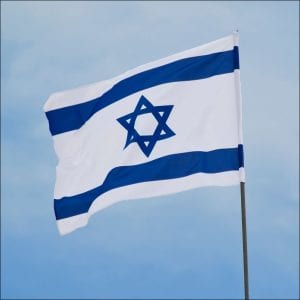
Flag of Israel
Following the census depicted at the beginning of Bamidbar, the Bible describes the layout of the Israelite camp in the desert. At the center of the camp is the Mishkan, a reminder that Hashem is always at the center of our lives. The Leviim surround the Mishkan, and the remaining tribes, organized into groups of three, surround the Leviim. Each tribe has its own flag featuring an insignia representative of the tribe’s unique character; each group of tribes also possessed a distinctive banner. At the First Zionist Congress in 1897, a flag was needed to represent the new movement being formed. David Wolfsohn, a prominent member of the early Zionist movement, described how he came up with the design they ultimately adopted: “What flag would we hang in the Congress Hall? Then an idea struck me. We [already] have a flag – and it is blue and white. The Tallit (prayer shawl) with which we wrap ourselves when we pray: that is our symbol. Let us take this Tallit from its bag and unroll it before the eyes of Israel and the eyes of all nations. So I ordered a blue and white flag with the Shield of David painted upon it. That is how the national flag, that flew over Congress Hall, came into being.”
53The Leviim, however, shall camp around the Mishkan of the Pact, that wrath may not strike the Israelite community; the Leviim shall stand guard around the Mishkan of the Pact.
נגוְהַלְוִיִּם יַחֲנוּ סָבִיב לְמִשְׁכַּן הָעֵדֻת וְלֹא־יִהְיֶה קֶצֶף עַל־עֲדַת בְּנֵי יִשְׂרָאֵל וְשָׁמְרוּ הַלְוִיִּם אֶת־מִשְׁמֶרֶת מִשְׁכַּן הָעֵדוּת׃
54The Israelites did accordingly; just as Hashem had commanded Moshe, so they did.
נדוַיַּעֲשׂוּ בְּנֵי יִשְׂרָאֵל כְּכֹל אֲשֶׁר צִוָּה יְהֹוָה אֶת־מֹשֶׁה כֵּן עָשׂוּ׃






